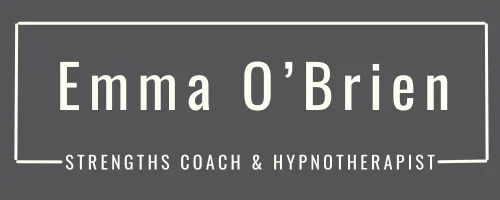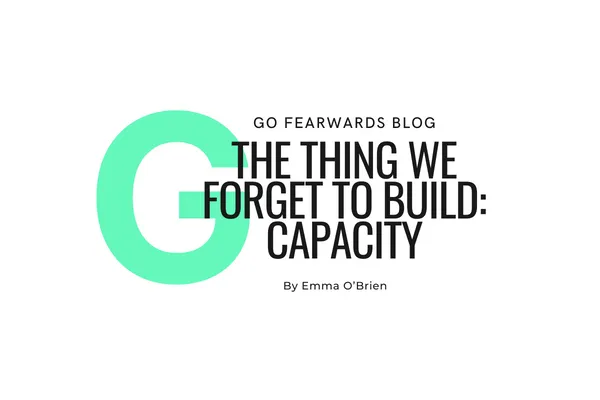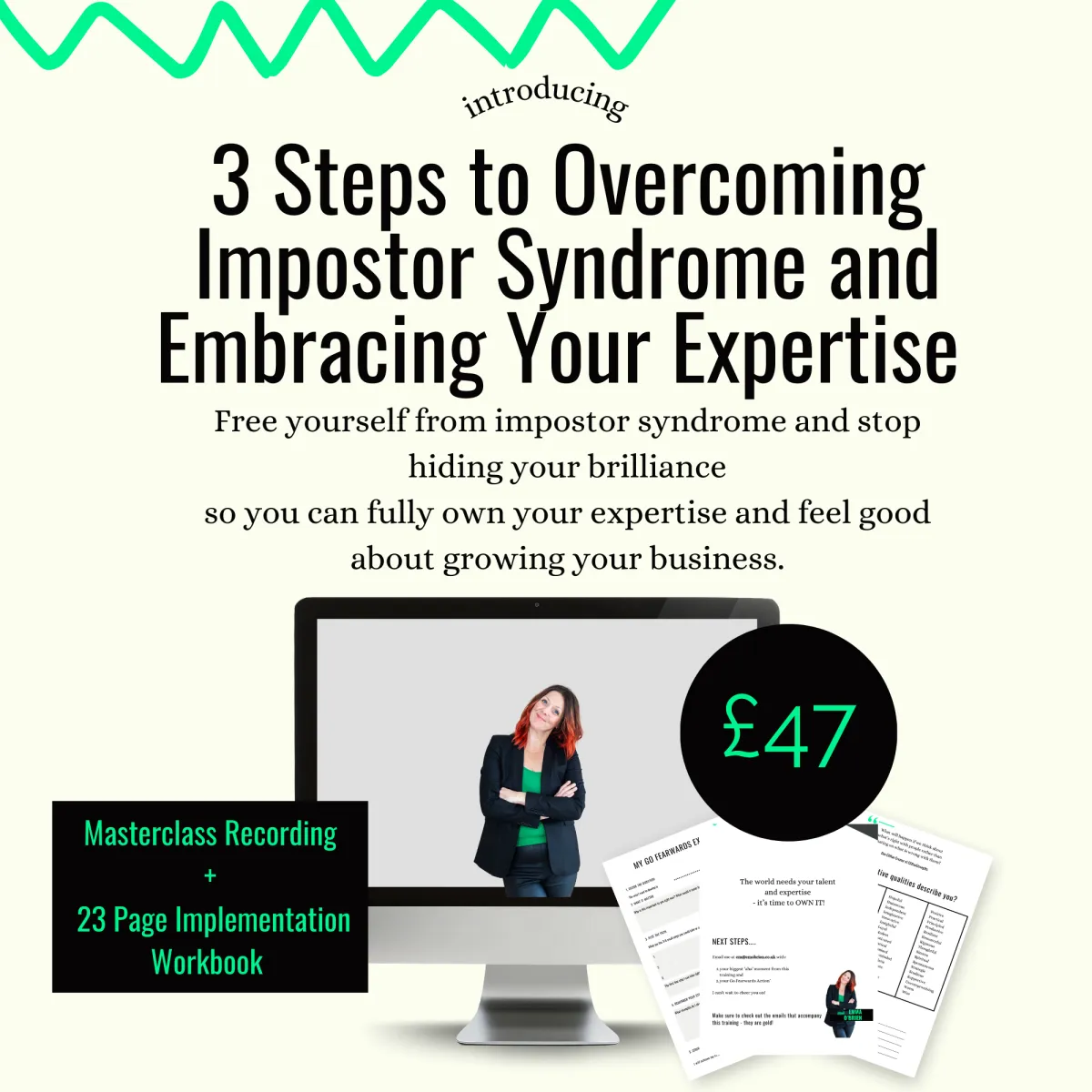

The ONE thing we forget to build: capacity
Go Fearwards Friday: 8 December
Hello there!
It's issue #28 of Go Fearwards Friday, where I share ideas and insights each week to encourage, inspire and equip you to embrace fear and fuel your potential.
This week at a glance:
Read time: 5 minutes
What is your capacity for doing what will be required to achieve your 2024 goals?
Here’s why thinking about your capacity is important and how to increase it to wherever it needs to be.
Honesty time..
Hands up if you ever underestimate what it takes to achieve your goals?
Yeah, me too!
Our ambitions are stretching because by definition they aren't within our experience. They take us from who we are and what we know now to somewhere that is unknown, something we haven’t yet experienced and embodied until we get there.
Even with the best of intentions, when you set out to achieve something meaningful and worthwhile to you, it’s likely to require you to dig deeper than you realised. Your capacity for doing new things, staying the course, dealing with the unexpected and things going wrong, even your capacity for how much fun, joy and success you can hold need to expand too.
Coupled with this, your capacity for doing challenging, uncomfortable, fear inducing things is not going to be stable throughout your life. There are times when you will feel more fearless, brave and resilient than others. We are never ‘one thing’ we are a process, ever evolving.
We transform and expand.
We can also shrink.
It’s the latter that can pull the rug out from beneath you and that’s what I want us to explore this week.
Where did my confidence go?
Ever notice in the past you might have tackled something without thinking and then these days you overthink, procrastinate and hit loads of resistance?
I’ve noticed this personally, it’s come up in conversations with my business friends and it’s something clients share with me too. It’s a thing! It happens for all sorts of reasons.
The stakes are higher. You’re doing challenging things that perhaps you haven’t done before or require you to show up in new ways.
You’ve been in a ‘steady state’ for a long time, doing something different might feel appealing but when it comes to it, it you’re out of your comfort zone.
Life happens! If you experience illness, injury, loss, caring responsibilities, juggling competing demands, changing hormones and so on it all makes demands on your system. If you’re healing or already juggling many balls, add something new and challenging to the mix (no matter how much you might want it or feel initially excited by it) you might find you don't have the capacity for it.
Do you see yourself in any of these?
I’ve found myself in all three at one time or another and I think that's probably quite normal. What we don't often do is realise it at the time!
If you are planning on an ambitious 2024,as I know many of you are, then it's worth giving some consideration to how you will prepare yourself for this physically and mentally i.e. how you will build your capacity, so you can enjoy the process and stay the course.
Building Capacity - An Action Plan
Level 1 - Meet your basic needs
This is your foundation. If 2024’s goals are a mountain to climb, this is the equivalent of the ‘medical check’ you’d do before you even contemplate it! It's asking yourself 'what’s my basic mental and physical fitness for what I'm committing to do?' and then preparing your system accordingly
A regulated nervous system and resilient mindset will stand you in good stead and that means making sure your basic needs are met as consistently as possible.
How many of these can you tick?
Sufficient rest (7-9 hours sleep)
Good and sufficient nutrition
Moderate physical movement (yoga, walking in nature, dancing)
Connecting with people you love/ secure relationships
A healthy relationship with yourself (being encouraging and kind)
Breathing consciously
Doing things that feel good e.g massage, singing
Level 2 - Your training plan
So many people trigger fear because they try to jump right in to the big things they want to achieve. Fear’s like a trip wire on the edge of your comfort zone. It initiates a physical response and a behavioural response. You’re going to find it harder to show up for your goals if you’re tense and anxious. If it's harder to show up, habits of avoiding and procrastinating creep in as well as unhelpful thinking patterns and your mental resilience takes a hit too.
So think about what you’re planning to do and who you’re planning to be.
What smaller steps can you make?
What skills do you need to learn?
What might feel like safer options to test things out and experiment that will serve to ease you in and build confidence?
What these look like depends on what you're trying to achieve and where you’re starting from. Think about how you can build up speed, like a car accelerating. Cars go through all speeds to hit 60 but how fast depends on how tuned up the engine is.
It's good to think about your capacity for change more generally too. If you never really change anything and now you want to make a big shift in your life, then start with changing small things. Move your furniture around, change your hair or the clothes you wear, alter your route to the shops, spend time with someone different, take a solo trip somewhere new. Making smaller changes help build capacity for change and trusting you can handle it.
Level 3 - Get a route map & support
Back to the mountain analogy. Even though it’s still going take a momentous effort to get to the summit, there are always some paths that are easier to navigate than others. Having a map to follow, or even better a person to guide you, is going to make your ascent faster, less scary, less lonely and you are less likely to give up on yourself.
Your route map might look like a step by step process or plan so you can see how to get from where you are now to where you want to be. It could be someone showing you the way in a training course or finding out how to do things through your own research. You might want to consider a combination of all these things as you navigate different points. Factor in the capacity you need to research, learn, discover and plot your path.
The route map is going to help you stay the course and use your energy efficiently as well as make what you’re about to do feel less uncertain (which triggers doubt and fears) and more familiar (which the mind loves).
Your support comprises your 'cheer squad' and your guides. The people or person who will remind you of the summit and what it means to you to get there, who will hold you accountable and encourage you to keep going, who will point out reality when you make things up because you're tired, emotional and what you’re doing is stretching you. People who will reflect their belief in you that you can do it and point out easier or more gentle ways.
Who can you recruit to your 'team'?
At what points do you think calling on support is going to be sensible?
P.S. Reading this on the blog? Subscribe here

Get Go Fearwards Friday delivered straight to your inbox
I agree to terms & conditions provided by the company. By providing my email address, I agree to receive emails from Emma O'Brien.
© Copyright 2022 Business Name.
